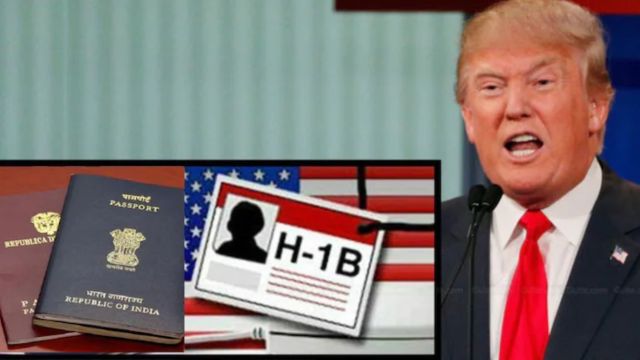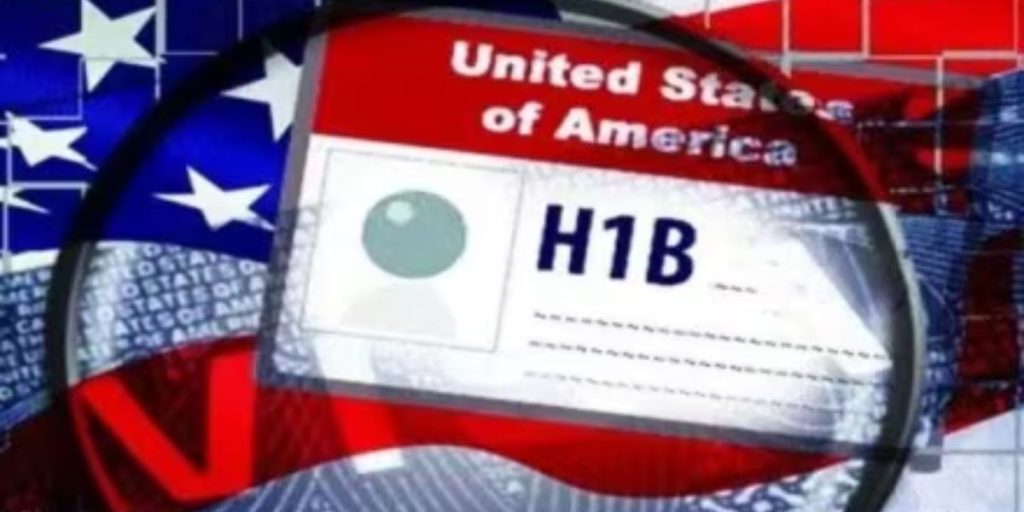In recent developments, former President Donald Trump has proposed a change that could significantly affect H-1B and L-1 visa holders, particularly those from India. Under the new policy, the Trump administration aims to eliminate the automatic renewal feature for these work visas, a move that could put thousands of workers in a precarious position.
H-1B and L-1 visas are among the most common work permits for foreign workers in the United States, with a large percentage of holders coming from India. These visa programs allow highly skilled workers to live and work in the U.S. for specific employers. However, Trump’s proposal has sparked concern, especially among Indian professionals who make up a significant portion of visa holders in industries like technology, healthcare, and finance.
What is Auto-Renewal for H-1B & L-1 Visas?
Under current U.S. immigration law, holders of H-1B and L-1 visas can typically renew their visas without having to go through a full re-application process. This auto-renewal provision allows visa holders to extend their stay in the U.S. beyond the initial visa period without the constant threat of deportation or being forced to reapply through a lengthy and expensive process.
- H-1B Visa: The H-1B visa is a non-immigrant visa that allows U.S. companies to employ foreign workers in specialty occupations, which typically require a higher degree of education or specialized knowledge. Workers on this visa are often employed in fields like tech, engineering, medicine, and more.
- L-1 Visa: The L-1 visa is for intracompany transferees. It allows employees of international companies to transfer to a U.S. branch, affiliate, or subsidiary. This visa also comes with auto-renewal privileges, making it easier for workers to extend their time in the U.S.
Under the current system, both H-1B and L-1 visa holders can stay for several years, depending on the specific circumstances and renewal status, often without worrying about reapplying for the visa every few years. This process also provides greater stability for employees and their families during their stay in the U.S.
Trump’s Proposal to End Auto-Renewal: What’s at Risk?

The proposal to eliminate auto-renewals for H-1B and L-1 visas could change the landscape for many Indian visa holders. If passed, the new rules would require workers to reapply for their visas every time they reach the end of their stay, regardless of whether their circumstances have changed.
Some of the key risks and implications of ending the auto-renewal provision include:
- Increased Uncertainty for Workers: The removal of auto-renewal means visa holders could face uncertainty regarding their future employment. Every visa holder would need to go through the full renewal process, and there’s no guarantee that renewals will be granted.
- Disruption for Employers: Companies that rely on skilled workers from abroad would need to navigate a much more complex process. Employers might face disruptions in their staffing, especially in sectors like technology, where Indian workers are crucial to daily operations.
- Increased Costs and Administrative Burden: Reapplying for visas can be expensive and time-consuming. Visa holders would be forced to pay additional fees, fill out paperwork, and potentially wait for approval each time their visa nears expiration. This would also place a burden on both visa holders and employers to keep up with administrative requirements.
- Potential for Longer Wait Times: The backlog for visa renewals could also increase significantly if auto-renewal is ended, further delaying the process for thousands of workers. The resulting wait times could extend months or even years, making it more difficult for visa holders to maintain their legal status in the U.S.
- Impact on Indian Workers: Indian nationals make up a substantial percentage of H-1B and L-1 visa holders, especially in fields like IT and engineering. A policy that removes auto-renewals could create even more barriers for Indian workers, making it harder for them to secure long-term employment in the U.S. and disrupting their family lives and financial stability.
What This Means for Indian Visa Holders
President Trump Links Federal Disaster Aid to State Policy Changes
For Indian workers holding H-1B and L-1 visas, Trump’s proposed policy could create significant challenges. Here’s how Indian nationals could be affected:
- Increased Anxiety Over Job Security: Many Indian workers in the U.S. rely on these visas to support their families and their careers. With auto-renewal removed, workers could experience greater anxiety about their ability to stay in the U.S., especially when facing bureaucratic delays or denials.
- Uncertainty Around Family Visas: The proposal may also affect family members of visa holders. In many cases, the H-1B visa holder’s spouse and children are granted dependent visas (H-4 visas), and the uncertainty around the renewal process could disrupt their ability to remain in the U.S. as well.
- Potential Impact on Immigration Plans: Indian nationals who had planned to transition to a Green Card or permanent residency status could face delays in the process. If auto-renewals are eliminated, the pathway to permanent residency could become more complicated and prolonged.
- Financial Impact: Indian workers may face additional costs related to visa renewals. They will need to pay more frequently for visa fees, lawyer fees, and the administrative costs associated with gathering the required documentation for each renewal. These added costs could further strain workers already dealing with high living expenses in the U.S.
What Can H-1B & L-1 Visa Holders Do?
If Trump’s proposal to end the auto-renewal of H-1B and L-1 visas moves forward, there are several steps that Indian visa holders can take to prepare:
- Stay Informed: Keep up with the latest updates from the U.S. Citizenship and Immigration Services (USCIS) and other reliable sources. Changes to immigration law can happen quickly, and it’s important to stay on top of new developments.
- Consult an Immigration Lawyer: If you’re worried about how these changes could impact your status, consider consulting with an immigration attorney. A legal expert can help you understand your options and provide guidance on the best course of action for your situation.
- Prepare for Renewals: Begin gathering all necessary documentation for the renewal process now, even if auto-renewal is still in place. If the policy changes, you’ll already have the documents ready to submit a timely and complete application.
- Explore Alternative Visa Options: If you’re concerned about the stability of your current visa, talk to your employer about alternative visa options or longer-term immigration plans. A good immigration lawyer can help you explore paths to permanent residency or other work visas that might provide more stability.
Trump’s proposed end to auto-renewal for H-1B and L-1 visas could have a far-reaching impact on Indian workers in the U.S. While it is unclear whether this policy will be implemented, it is important for all visa holders to stay informed and be prepared for potential changes.
Keeping up with the latest news, consulting legal experts, and organizing your paperwork early can help mitigate the uncertainty surrounding the future of these visas. If you’re a visa holder or employer in this situation, it’s crucial to start preparing for what could be a very different immigration landscape in the near future.





More Stories
Trump’s New Policy Threatens H-1B & L-1 Auto-Renewal: What Indian Visa Holders Need to Know
Trump’s New Policy Threatens H-1B & L-1 Auto-Renewal: What Indian Visa Holders Need to Know
Trump’s New Policy Threatens H-1B & L-1 Auto-Renewal: What Indian Visa Holders Need to Know